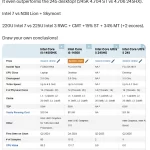The Minister of Education, Tunji Alausa, has directed heads of public tertiary institutions to publish key institutional data on their official websites.
Mr Alausa mandated all the institutions to publish in full a breakdown of their annual budgetary allocation on personnel cost, overhead costs and capital expenditures as well as their research grant revenue, including from the Tertiary Education Trust Fund (TETFund).
The minister also asked the institutions to provide their current total student population, categorised into undergraduate and postgraduate levels.
The ministry’s spokesperson, Folasade Boriowo, said the directive was part of the government’s move to entrench transparency, accountability, and good governance in the institutions.
“The Ministry emphasises that this information must be presented in a clear, accessible, and user-friendly format for public visibility. Websites should be structured in a way that allows the public, including parents, students, and stakeholders, to easily locate and understand these data points,” the statement said.
“All federal institutions are expected to comply fully with this directive and ensure that their websites are completely updated no later than 31 May 2025.
“This data should be separated into two distinct sources: grants obtained from domestic bodies such as local industries, government agencies, or foundations; and those received from international sources, including foreign institutions, multilateral organisations, and development partners,” the statement said.
The statement added that the figure must be updated quarterly to ensure currency and transparency.
It added that the education ministry will conduct periodic reviews of institutional websites and take appropriate administrative actions against non-compliant institutions.
“These reviews will be used to gauge compliance and drive policy decisions that promote transparency,” the statement added.
Financial secrecy
A recent report by the Athena Centre for Policy and Leadership revealed that financial secrecy in Nigerian universities affects their ability to access global research funding.
The report, which surveyed 64 Nigerian universities, noted that none of the institutions made their financial records publicly available.
ALSO READ: EDITORIAL: Tinubu, stop this gratuitous proliferation of universities!
The report added that the majority of federal universities surveyed also ignored formal requests for financial information under the Freedom of Information (FOI) Act.
The report described the prevalence of financial secrecy among the institutions as a fundamental governance weakness that systematically excludes these institutions from the global research funding ecosystem and diminishes their international credibility.
It noted that the culture of secrecy reinforces external perceptions that Nigerian universities are high-risk partners that are unprepared to manage international grants or major research funding.
Support PREMIUM TIMES’ journalism of integrity and credibility
At Premium Times, we firmly believe in the importance of high-quality journalism. Recognizing that not everyone can afford costly news subscriptions, we are dedicated to delivering meticulously researched, fact-checked news that remains freely accessible to all.
Whether you turn to Premium Times for daily updates, in-depth investigations into pressing national issues, or entertaining trending stories, we value your readership.
It’s essential to acknowledge that news production incurs expenses, and we take pride in never placing our stories behind a prohibitive paywall.
Would you consider supporting us with a modest contribution on a monthly basis to help maintain our commitment to free, accessible news?
Make Contribution
TEXT AD: Call Willie – +2348098788999
© Premium Times









